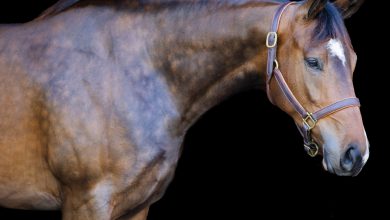Can Dogs Eat Cockroaches? Possible Health Risks & Care Tips
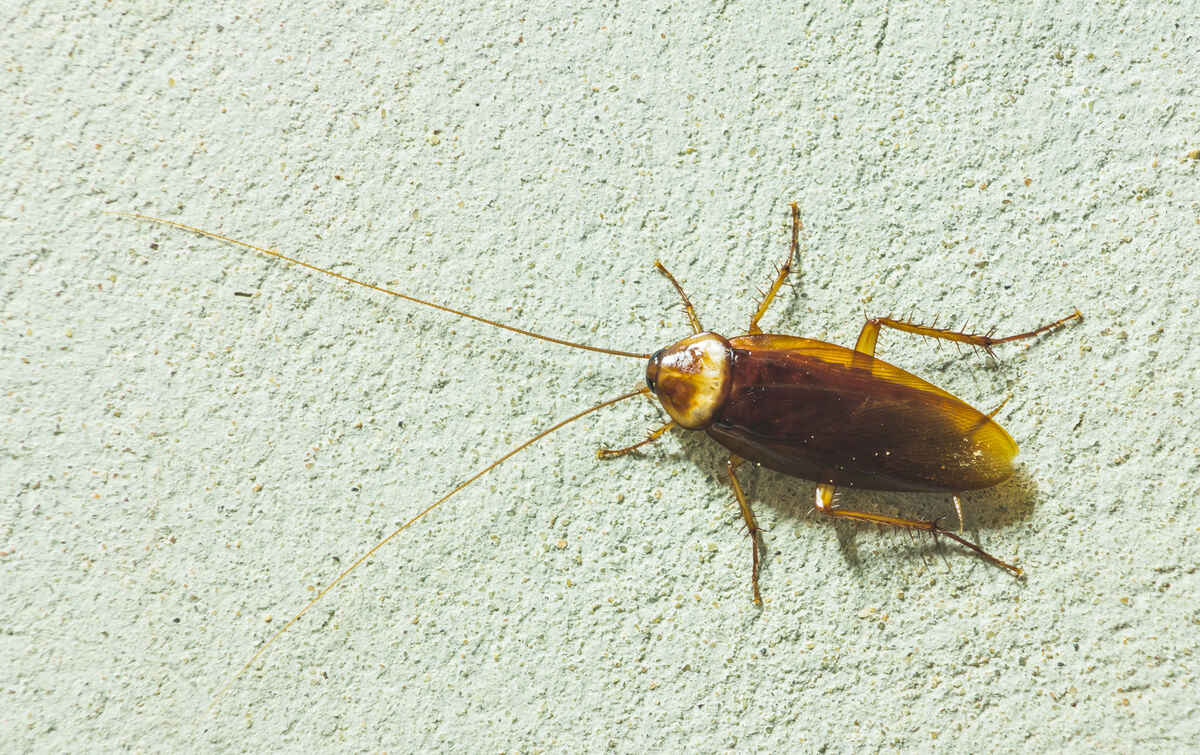
Whether your dog has recently eaten a cockroach, it’s happened before, or you’re just wondering, this is a likely enough scenario that you should know the facts. Depending on your dog’s temperament, and, of course, the environment, they may rarely chase bugs or may do it whenever one presents itself. So, can your dog eat roaches safely, or is it cause for concern?
Dogs can eat cockroaches without risk of major hazards, but they shouldn’t.
In case your pet is in the habit of chowing down on these gnarly pests, or any unsanctioned nutrition sources, it’s always a good idea to make sure they have plenty of fresh clean water available and are getting fed regularly, as it will help alleviate any minor gastric upset that may result.
The 5 Ways Roaches Can Harm Dogs
Technically, no. Nothing inherently in cockroach physiology can hurt your dog. Even so, there are still ways that ingesting a roach can cause bodily harm to your dog. If any of the following occur, or even if you think they might have, you should seek immediate veterinary attention:
1. Physical Damage
First of all, as arthropods, cockroaches have a hard outer shell (exoskeleton) that protects their internal workings. As you probably know, this shell is hard and brittle, the better to do its job.
Additionally, as disgusting as it may be, the chances of the pest having expired before entering your dog’s system are very small. Dogs are carnivores, which means they aren’t very big chewers—it’s not what they’re built for.
Between the roaches’ hard exterior and the likelihood of it squirming around between the world and the dog’s stomach, it’s possible that even a single roach can inflict scrapes or lacerations on the inside of your pet’s mouth and throat.

2. Allergies
It’s possible that your dog may have an allergy to cockroaches, which can cause an allergic reaction involving swelling. Luckily, this is very rare.
3. Disease
Cockroaches are known for traveling through all kinds of nasty environments, spending time in and feeding on feces and decaying organic matter. Needless to say, they can easily carry all kinds of infectious contaminants.
Roaches can host and transport a range of bacteria including salmonella, staphylococcus, and streptococcus, and ingested bacteria can survive in the cockroach’s gut almost indefinitely, and spread if they are consumed or by droppings.
Should your dog be so unlucky as to consume one of these diseased insects, likely symptoms can include gastroenteritis, diarrhea, vomiting, lethargy, and general weakness.
As always, if any of these conditions present themselves, take your dog to the vet as soon as possible.
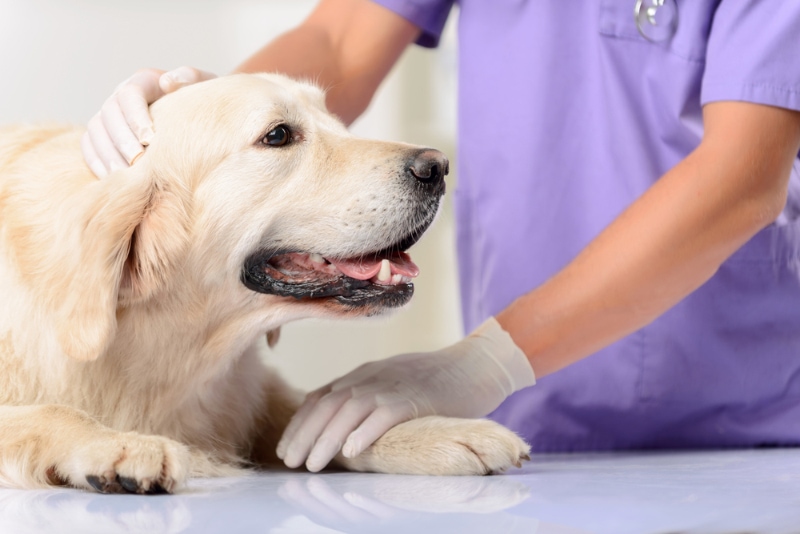
4. Parasites
Roaches often carry parasites, such as Physaloptera (stomach worm), and roundworm, both of which can transfer to your pooch after ingestion.
The worms attach to your dog’s stomach and intestinal lining, resulting in infection of the digestive tract and hijacking important nutrients. Vomiting, dark feces, and lethargy are symptoms that can notify you of the infestation.
Parasites can, fortunately, be eradicated with antibiotics or other treatments from your vet.
5. Poisoned Cockroaches
Poison is often employed by people to get rid of these pests, and it’s common for cockroaches to carry the poison on their bodies since many of these products are designed not to kill the cockroach on contact but rather be conveyed back to the nest to spread to other cockroaches.
Even if you haven’t set out poison, your neighbors may well have, and, as we know, cockroaches can roam freely between homes.
Roach poison is toxic to dogs, as you’d imagine. Nonetheless, the dosage required to kill a cockroach is normally low enough to not cause serious illness in your dog. Having said that, negative symptoms can occur, so you must monitor closely and contact the vet promptly if any adverse signs appear. Digestive upset is most likely and can result in dehydration if not dealt with.
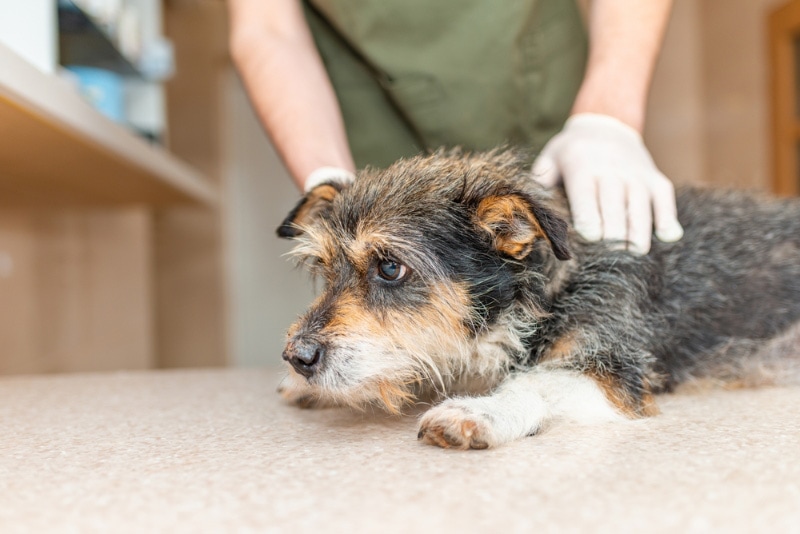

Why Does My Dog Eat Cockroaches?
The characteristic activity of a cockroach, scurrying about all over the place, can be a strong trigger for your dog to capture it. This prey drive isn’t a bad thing in and of itself, it can be quite healthy for them, but eating roaches is no pet owner’s idea of a good time.
What Should I Do If My Dog Eats a Cockroach?
If your dog has eaten a cockroach, there’s little you can or should do, aside from monitoring your dog closely for symptoms. Sickness is likely to present itself within 1 to 24 hours after ingestion, most often as digestive upset, lack of appetite, lethargy, and maybe vomiting in extreme cases. If any symptoms do present themselves, you must contact a vet promptly.
While they’re unlikely to need treatment, it’s important to get your dog checked and monitored. The vet may want you to keep your dog hydrated to recover from any fluid loss through diarrhea or vomiting.
If your dog has contracted some form of parasite or worm, a veterinarian will hopefully detect it early and provide a deworming solution, or, at least get you set up to watch out for the parasites later on.
Cockroach Facts
- The most common varieties of cockroach are German, American, Brown-Banded, and Oriental.
- Cockroaches have existed on Earth for more than 280 million years.
- Roaches can survive without food for a month or longer, although they will expire in a week without water.
- They are hatched as perfect miniatures of their adult forms and shed their exoskeletons as they grow.
- One female will lay hundreds of eggs over her lifetime, with an average output reaching 30 a month, making it easy to heavily populate a location in a short time.
- Cockroaches submerged underwater can still live for half an hour.
- They don’t need their heads to live, and decapitated cockroaches will die after a week only from thirst, not being able to drink
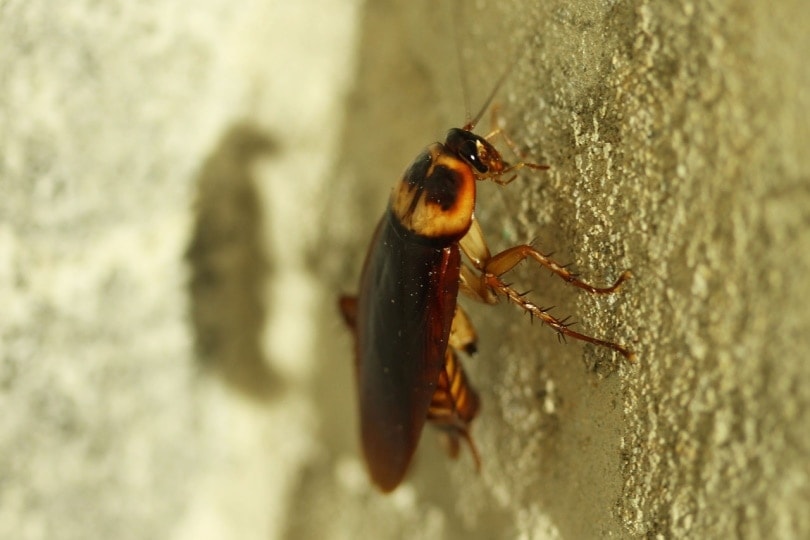

Conclusion
It’s not guaranteed, by any stretch, that your dog will be harmed by eating one or two cockroaches—no matter how gross it is.
Still, if you have noticed your dog scarfing down one of these little bugs, it’s important to keep your eye on them and be vigilant and ready to seek help from your vet right away in the event of any unusual symptoms.
Featured Image Credit: S. Narongrit99
